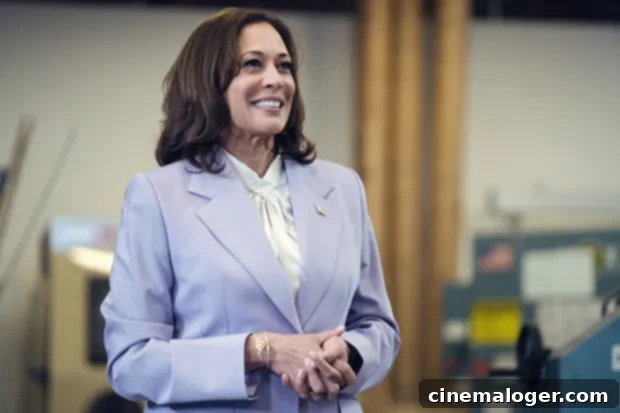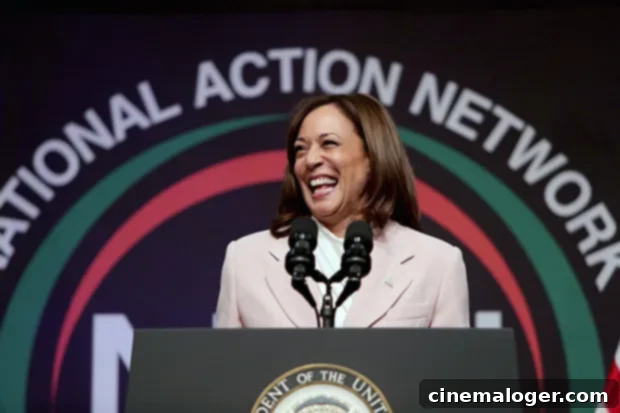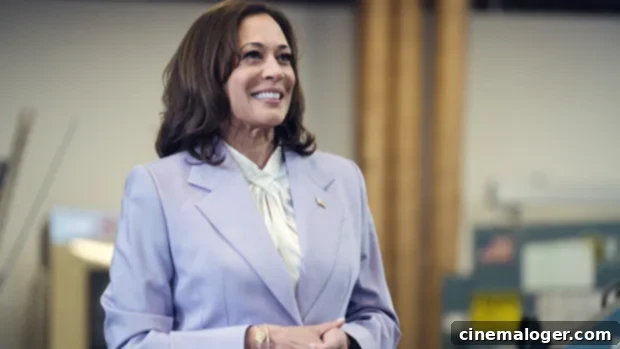Vice President Kamala Harris Champions Gun Safety, Women’s Rights, and Key Democratic Values on The Jennifer Hudson Show
Vice President Kamala Harris recently made a significant appearance on The Jennifer Hudson Show, engaging in a candid and wide-ranging discussion about some of the most pressing issues facing the United States. The interview, which aired on Thursday, April 20, provided a crucial platform for the Vice President to articulate the Biden-Harris administration’s stance on gun safety, women’s reproductive rights, healthcare, and the importance of democratic participation. With host Jennifer Hudson, 41, guiding the conversation, Vice President Harris, 58, offered insights into her policy priorities and the challenges of governing in a deeply divided nation. Her remarks resonated particularly strongly given the timing, coming just weeks after the tragic mass shooting at the Covenant School in Nashville, an event that once again brought the urgent need for legislative action on gun violence to the forefront of national discourse.
During the impactful interview, Vice President Harris directly challenged the commonly presented false dichotomy that suggests one must choose between supporting the Second Amendment and advocating for reasonable gun safety laws. She firmly stated, “When I look at the tragedies all over our country that have affected so many people so personally, and the senseless nature of it all, because here’s the thing: first of all, we shouldn’t have to be presented with this false choice, which suggests you’re either in favor of the Second Amendment or you want reasonable gun safety laws. That’s a false choice.” Her statement highlighted a core belief that responsible gun ownership and effective measures to prevent gun violence are not mutually exclusive but can, in fact, coexist. This argument is central to the administration’s approach to an issue that continues to inflict profound pain and loss upon communities nationwide.
Harris further clarified her position by unequivocally labeling the call for universal background checks for gun owners as “reasonable,” despite the significant political resistance such measures often face. She emphasized that these are not radical demands but common-sense provisions that enjoy broad public support. Beyond background checks, the Vice President passionately advocated for a ban on some of the most lethal firearms, specifically targeting assault weapons. She declared, “It is reasonable to say that weapons of war have no place on the streets of America. We need an assault weapons ban. These are reasonable things to do.” This strong stance underscores the administration’s commitment to tackling gun violence by removing military-style weapons from civilian circulation, arguing that such weapons are designed for mass casualties and have no legitimate place in everyday society. The push for an assault weapons ban is a recurring theme in the Democratic platform, often reignited by the frequency and devastation of mass shootings.
In a powerful call to action, Vice President Harris urged members of Congress to demonstrate courage and legislate meaningful change, rather than succumbing to the immense influence of gun lobbyists. “I think it is pitiful that the people in the United States Congress do not have the courage to stand up to the gun lobbies, to stand up to the NRA, and say, ‘Look, I support the Second Amendment, but we need reasonable gun safety laws,'” she asserted. “Have the courage.” Her words served as a direct challenge to lawmakers, imploring them to prioritize the safety and well-being of their constituents over political expediency and the financial power of organizations that oppose stricter gun control. The Vice President highlighted the perceived disconnect between public opinion, which largely favors gun safety reforms, and congressional inaction, a source of growing frustration for many Americans.
Beyond the legislative aspects, Harris also touched upon the profound and often traumatic impact of gun violence on the nation’s children. She expressed deep sorrow over the ways children have been forced to react to mass shootings and endure active shooter drills in their classrooms, designed to keep them safe but inadvertently contributing to their psychological distress. The Vice President lamented the reality that children are growing up in an environment where such drills are routine, potentially traumatizing an entire generation. Her empathy extended to her recent visit to Tennessee following the Nashville shooting, where she witnessed firsthand the grief and resilience of the community. During her remarks, she sharply criticized the local legislature for their controversial decision to expel two members who joined peaceful protests advocating for further gun safety measures, viewing it as an affront to democratic principles and the right to peaceful assembly.
While discussing the expulsion of the Tennessee legislators, Vice President Harris underscored the critical importance of young leaders for the future trajectory of the country. “We need our young leaders,” she proclaimed. “Some of the greatest, if not all the movements in our nations that have been about progress have been lead by our young leaders.” This statement reflected her belief in the power of youth activism and their role in driving social and political change. She drew parallels to historical movements where younger generations spearheaded progress, implying that the current push for gun safety and other reforms could similarly be energized by emerging leaders and their unwavering commitment to a better future. This emphasis on youth empowerment is a consistent message from the Biden-Harris administration, recognizing the demographic shifts and the evolving political landscape.
Shifting gears to another pivotal national issue, Vice President Harris used a separate segment of the interview to vehemently oppose the Supreme Court’s monumental decision to overturn Roe v. Wade. She articulated a foundational belief that decisions concerning a woman’s body should rest solely with her, not with the government. “The highest court in our land, the United States Supreme Court, took a Constitutional right that had been recognized from the women of America, and by undoing Roe V. Wade, basically made a statement that the government is in a better position to tell women what to do with their own bodies than that woman is,” she explained. “The government should not be telling her what to do with her body.” This powerful defense of bodily autonomy highlights a core tenet of women’s reproductive rights advocacy, emphasizing individual liberty and the right to make personal healthcare decisions without political interference.
Continuing her impassioned argument, Harris denounced efforts across the country to impose blanket bans on abortion, reaffirming that the ultimate decision should always be with the woman. She framed the fight for reproductive freedom within the broader historical context of expanding rights in America. “The strength of our country has in so many ways been the continuous path toward the expansion of rights, and now we’re seeing these extremist so-called leaders who are trying to restrict rights, and on this issue, there’s a simple point at play as far as I’m concerned: trust women to make decisions about what’s in their best interest,” she stated. Her remarks serve as a direct rebuke to conservative efforts to curtail abortion access, characterizing them as a regressive step that undermines the nation’s progress toward greater equality and freedom. The Vice President’s emphasis on “trusting women” is a powerful message aimed at empowering individuals and pushing back against what she perceives as governmental overreach into personal medical choices.
The Vice President’s appearance on The Jennifer Hudson Show occurred approximately two months after she demonstrated steadfast support for President Joe Biden during the 2023 State of the Union address in February. Her presence and visible solidarity at such a significant event underscored the strong partnership between the two leaders. Prior to the State of the Union, Harris delivered a poignant and powerful speech at the funeral for Tyre Nichols, whose tragic death after being brutally beaten by police officers in Memphis ignited national outrage and reignited calls for police reform. During her emotional address, Harris passionately advocated for sweeping changes to policing practices, stating, “This is a family that lost their son and their brother through an act of violence at the hands and the feet of people who had been charged with keeping them safe.” Nichols’ grieving parents were also invited as honored guests of President Biden at the State of the Union, further amplifying the administration’s commitment to addressing racial injustice and police accountability.

This high-profile interview on The Jennifer Hudson Show also comes amidst widespread anticipation for President Biden’s official announcement regarding his 2024 campaign for president. While the President has been transparent about his intentions to seek re-election, he had not yet formally launched his campaign efforts at the time of the interview. It is widely expected that if Biden does run, he will once again select Vice President Harris as his running mate, solidifying their unified front for the upcoming election cycle. During the White House Easter Egg Roll, President Biden reiterated his plans to run again in an interview with Today, stating, “I plan on running. We’re not prepared to announce it yet.” This ongoing narrative of an impending re-election bid underscores the importance of Vice President Harris’s public appearances in conveying the administration’s policy stances and vision for the future.
Prior to her poignant appearance at Tyre Nichols’ funeral, Vice President Harris participated in a momentous legislative event in December, when President Biden signed the Respect For Marriage Act into law. This landmark legislation provides crucial federal protections for both gay marriages and interracial marriages, marking a significant step forward for civil rights in the United States. In a powerful symbolic gesture, President Biden handed the signing pen to Vice President Harris. This act was particularly meaningful given that Harris and her husband, Second Gentleman Douglas Emhoff, are in an interracial marriage, making the moment a deeply personal and resonant affirmation of the law’s importance and the administration’s commitment to equality for all families.
Earlier in December, the Vice President also played a prominent role at President Biden’s first-ever State Dinner, a prestigious diplomatic event hosted for French President Emmanuel Macron and his wife, First Lady Brigitte Macron. Such state dinners are significant opportunities for international diplomacy and cultural exchange. During the elegant affair, Harris captivated attendees in a beautiful black gown, showcasing her grace and presence on the world stage. In a lighter moment that highlighted her approachable public persona, she even posed for a delightful photo with a fictional vice president, actress Julia Louis-Dreyfus, renowned for her iconic portrayal of a vice president over seven seasons of the satirical political comedy Veep. This interaction provided a moment of levity amidst the serious responsibilities of her office, showcasing her ability to connect with diverse audiences.

The compelling interview on The Jennifer Hudson Show also marked Vice President Harris’s first daytime talk show appearance in nearly two years, a significant return to a popular format for direct communication with the public. Her previous daytime talk interview was on The View in September 2021. Unfortunately, that appearance was marred by an unforeseen incident when co-hosts Ana Navarro and Sunny Hostin both falsely tested positive for COVID-19 live on air, leading to their abrupt departure from the set. Despite the on-air chaos, Vice President Harris handled the situation with grace, ultimately conducting her interview via video from backstage. Her seamless and thoughtful engagement on The Jennifer Hudson Show highlights her continued dedication to reaching out to the American people and discussing critical issues, demonstrating resilience and a consistent commitment to her role as a prominent national leader. This appearance reinforced her platform and allowed her to effectively communicate the administration’s agenda on key policy areas that profoundly affect the lives of millions.
